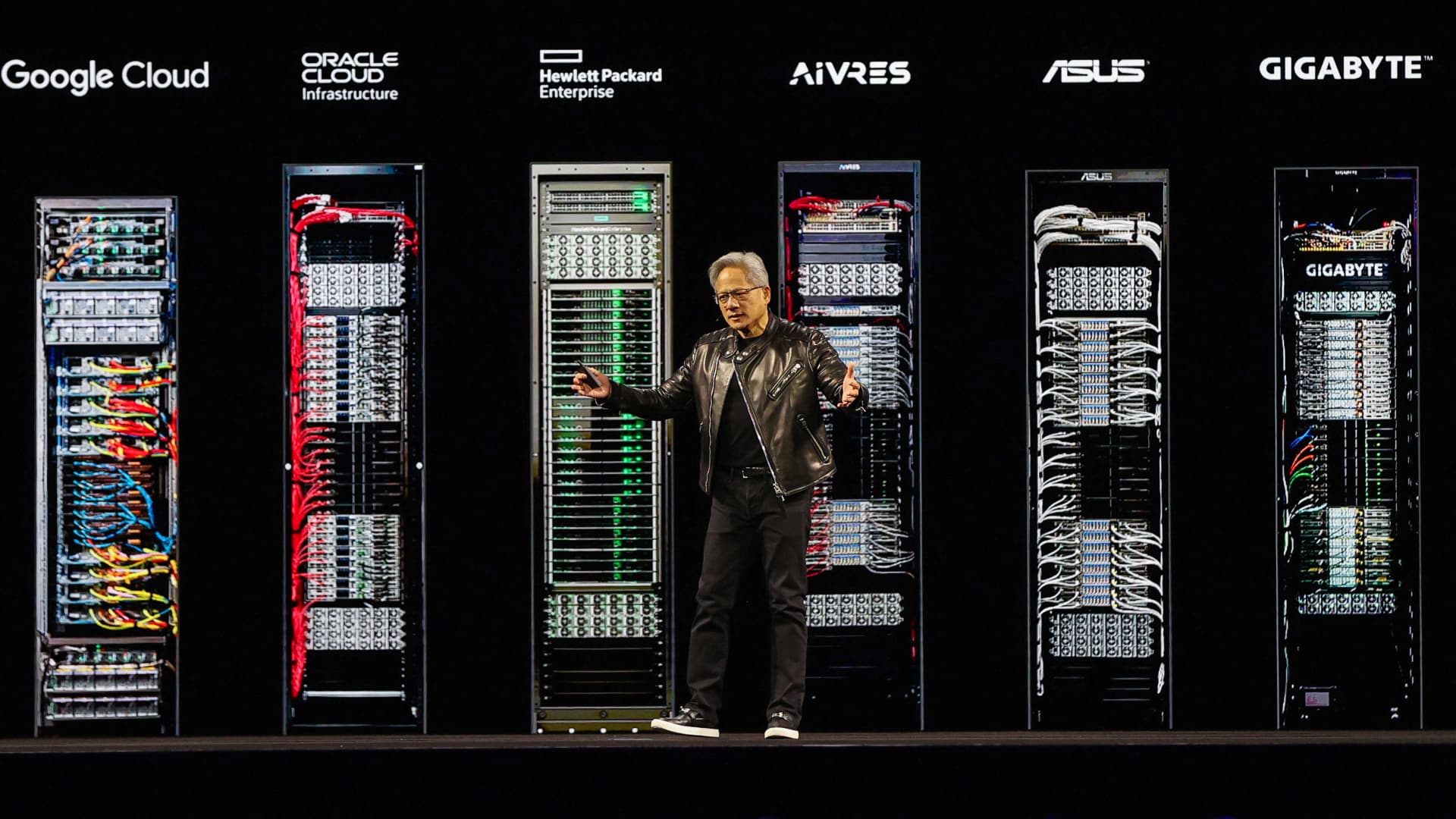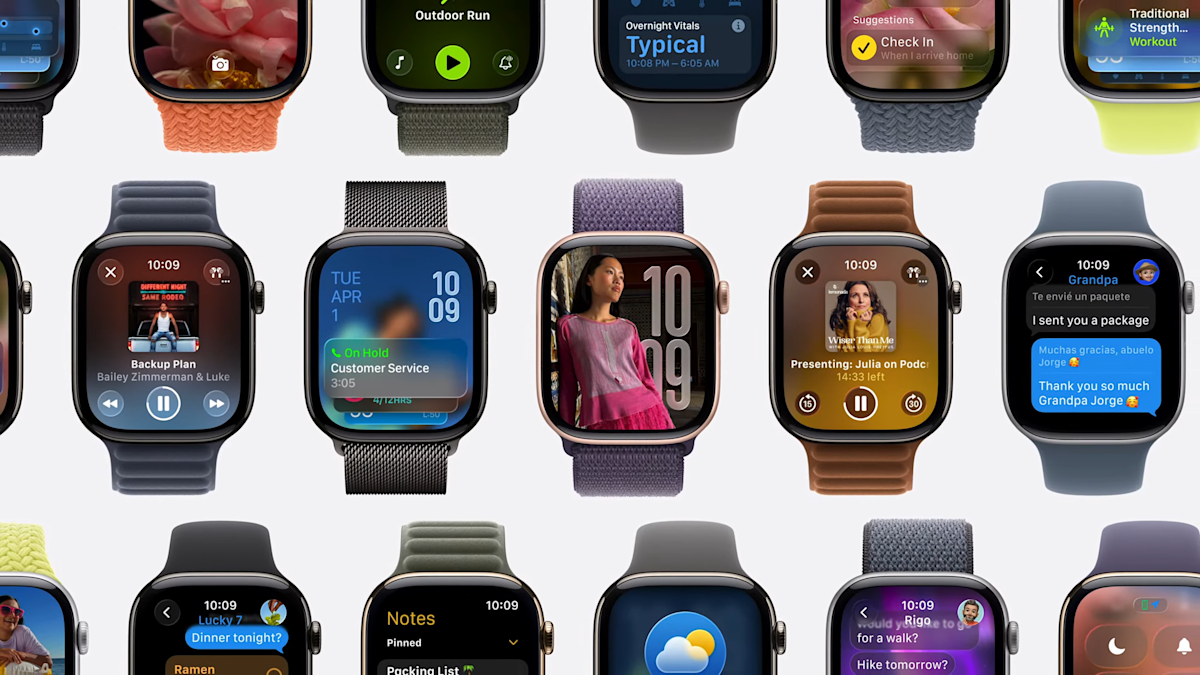Say hello to ionocaloric cooling. It’s a new way to lower temperatures with the potential to replace existing methods of chilling things with a process that is safer and better for the planet.
Typical refrigeration systems transport heat away…

Say hello to ionocaloric cooling. It’s a new way to lower temperatures with the potential to replace existing methods of chilling things with a process that is safer and better for the planet.
Typical refrigeration systems transport heat away…

“We’re at 157 percent tariff for them. I don’t think that’s sustainable for them,” Trump said.
“They want to get that down, and we want certain things from them,” he added.
Trump is set to meet with Chinese leader Xi Jinping at the…

For the first time, astronomers have seen life’s building blocks in ice beyond the borders of our galaxy.
Among a mix of complex organic molecules trapped in ice circling a newborn star in the Large Magellanic Cloud, researchers found ethanol,…

Millions of asteroids are currently zipping through our solar system. These rocky remnants of the early solar system receive extra attention when their itinerary brings them too close to Earth—which, fortunately, astronomers can…

Cameron Pappas, owner of Norton’s Florist
Norton’s
For Cameron Pappas, owner of Norton’s Florist in Birmingham, Alabama, the artificial intelligence boom is a world away.
While companies like Nvidia, Alphabet and Broadcom are lifting the stock market to fresh highs and bolstering GDP, Pappas is experiencing what’s happening in the real economy, one that’s far removed from Wall Street and Silicon Valley.
Small businesses like Norton’s, and companies of all sizes in retail, construction and hospitality, are struggling from higher costs brought by the Trump administration’s sweeping tariffs, and as downbeat consumers reduce their spending.
“We’ve just got an eagle eye on all of our costs,” Pappas, 36, told CNBC in an interview.
Norton’s generated $4 million in revenue last year, selling flowers, plants and gifts to locals. To avoid raising prices, which could cause customers to flee, Pappas has been forced to get creative, reworking some of his designs.
“If a bouquet has 25 stems in it, if you reduce that by three to four stems, then you’re able to keep the price the same,” Pappas said. “It’s really forced us to focus on that and to make sure that we’re pricing things the best that we possibly can.”
Pappas’ story and many like it are being masked in the macro data by the power of AI. In the first half of the year, AI-related capital expenditures contributed to 1.1% of GDP growth, according to a September report from JPMorgan Chase. That spending outpaced the U.S. consumer “as an engine of expansion,” the report said.
Total U.S. GDP increased at an annual rate of 3.8% during the second quarter of 2025 after falling 0.5% in the first quarter, the Commerce Department said.
U.S. manufacturing spending has contracted for seven straight months, according to the Institute for Supply Management. And construction spending has been flat to down, due to high interest rates and rising costs. Cushman & Wakefield said in a report this month that total project costs for construction in the fourth quarter will be up 4.6% from a year earlier because of tariffs on building materials.
The stock market shows a similar disconnect between AI and everybody else.
Nvidia CEO Jensen Huang delivers the keynote for the Nvidia GPU Technology Conference (GTC) at the SAP Center in San Jose, California, U.S. March 18, 2025.
Brittany Hosea-Small | Reuters
Eight tech companies are valued at $1 trillion or more and, to varying degrees, are all tied to AI. Those companies — Nvidia, Microsoft, Apple, Alphabet, Amazon, Meta, Tesla and Broadcom — make up about 37% of the S&P 500. Nvidia, with a $4.5 trillion market cap, accounts for over 7% of the benchmark’s value by itself.
Investors are giddy about the massive investments they’re seeing in AI infrastructure. Broadcom shares are up more than 50% this year after more than doubling in each of the prior two years, while Nvidia and Alphabet have jumped almost 40% in 2025.
That explains why the S&P 500 and Nasdaq are up 15% and 20%, respectively, reaching record highs on Friday, even as the government shutdown continues to cause economic angst.
Meanwhile, the S&P 500 subgroups that include consumer discretionary and consumer staples companies have increased by less than 5% year to date.
The latest troubling sign in the consumer market came on Thursday, when Target said it’s cutting 1,800 corporate jobs — the retailer’s first major round of layoffs in a decade. Target shares have plunged 30% this year.
“I think the message that the AI economy is sort of driving up the GDP numbers is a correct one,” Arun Sundararajan, a professor at New York University’s Stern School of Business, told CNBC in an interview. “There may be weakness in the rest of the economy, or not weakness, but there may be more modest growth.”
Investors will hear all about AI in the coming days, the busiest stretch of the quarter for tech earnings, and will be listening closely for additional guidance on capital expenditures. Meta, Microsoft and Alphabet report on Wednesday, followed by Apple and Amazon on Thursday.
Nvidia’s stock over the last year.
Last month, Nvidia announced a $100 billion investment in OpenAI, a startup valued at $500 billion. The capital will help OpenAI deploy at least 10 gigawatts of Nvidia systems, which is roughly equivalent to the annual power consumption of 8 million U.S. households.
Shares of Advanced Micro Devices have doubled this year and soared more than 20% earlier this month after the chipmaker announced a deal with OpenAI, while Oracle has been on a tear of late due to its ties to OpenAI and the broader infrastructure buildouts.
“Are we sort of inflating the economy now, thereby setting ourselves up for a crash in the future?” Sundararajan said. He added that he’s not seeing signs that demand for AI infrastructure will slow anytime soon.
When it comes to local businesses, most only know about the AI gold rush from the news headlines. One in four small business owners are stuck in “survival mode” as they contend with challenges like rising costs and tariffs, according to a September KeyBank Survey. It’s a segment of the economy that routinely accounts for about 40% of the nation’s GDP.
Pappas’ flower shop was founded in 1921, and purchased by his dad in 2002. The business has survived the Great Depression, World War II and the Covid pandemic. Pappas said his father, who died in 2022, reminded him that these periods were “just another season” for Norton’s, and that such challenges come with the territory.
But Trump’s tariffs have created a whole new set of constraints, as roughly 80% of all cut flowers in the U.S. are imported from countries like Colombia and Ecuador, according to the U.S. Department of Agriculture.
There’s no way for Norton’s to avoid higher import costs, but Pappas said he’s started buying some flowers directly from South American growers, which saves him money versus going through distributors that charge extra.
Pappas said it’s part of his “tariff price management” effort.
Trump’s tariffs will cost global businesses more than $1.2 trillion this year, and most of those costs are being passed onto consumers, according to S&P Global.
With the holiday season rapidly approaching, consumer sentiment is of particular importance. The picture is bleak.
The majority of U.S. consumers, 57%, that responded to a Deloitte survey published this month said they expect the economy to weaken in the year ahead, up from 30% a year ago. It’s the most negative outlook since the consulting firm began tracking sentiment in 1997.
Gen Z consumers, which the survey defined as ages 18 to 28, said they plan to spend an average of 34% less this holiday season compared to last year. Millennials, those between 29 and 44, said they expect to spend an average of 13% less this holiday season.
Additionally, seasonal hiring in the retail industry is poised to fall to its lowest level since the 2009 recession, according to a September report from job placement firm Challenger, Gray & Christmas.
The firm released another report earlier this month that showed new hiring in the U.S. has totaled just under 205,000 so far this year, off 58% from the same period last year.
The Starbucks logo is displayed in the window of a Starbucks Coffee shop on Sept. 25, 2025 in San Francisco, California.
Justin Sullivan | Getty Images
Starbucks announced a $1 billion restructuring plan in September that involves closing several stores in North America. Around 900 nonretail employees were laid off as part of the plan, and the company let go of another 1,100 corporate workers earlier this year.
Starbucks shares are down about 6% this year.
Shares of Wyndham Hotels & Resorts slumped on Thursday after the hotel chain issued disappointing third-quarter results. CEO Geoff Ballotti cited a “challenging macro backdrop” in the company’s earnings release. The stock is down roughly 25% year to date.
Even in parts of the tech industry that have benefited the most from the AI boom, companies have been conducting layoffs. Microsoft announced plans to cut around 9,000 jobs in July, which the company partly attributed to reducing layers of management. Salesforce is one of a number of tech companies that have announced layoffs, saying that AI can now handle the work.
But Hatim Rahman, an associate professor specializing in AI at Northwestern University’s Kellogg School of Management, said that most businesses using AI for efficiencies won’t find them right away. So companies can’t count on the technology to counter declining revenue and, Rahman said, “the road to the future is going to be bumpy.”
“AI is not a plug-and-play solution,” Rahman said. “For many organizations, it’s going to involve engagement with people, processes, culture, tools to be able to reap the benefits. And in the aggregate, it’s going to take time.”
WATCH: The AI boom is lifting the stock market, but it may be masking a weaker economy


If you’re moving on to a new Apple Watch, selling your current one or fixing some software hiccups, you’ll probably need to disconnect it from your iPhone. Apple calls this unpairing; it’s the step that wipes your watch, breaks the…

For the first time ever, scientists have tracked the brain activity of mammals navigating in the wild – not in a lab, but out in the open world.
A small group of fruit bats soared across the skies of Latham Island, doing what bats normally do….

Meta is discontinuing its desktop Messenger apps for Windows and Mac. Starting Dec. 15, you’ll need to head to Facebook to continue chatting through the app on your computer.
Once the sundowning process begins, you’ll receive an in-app…

Lions v Ulster (12:45 BST)
Rob Herring captains Ulster
Joe Hopes makes his first Ulster start after being named in the…

Vulnerable deep-sea habitats will be mapped with the help of artificial intelligence (AI) in a study made possible by a £2m investment.
The Deep Vision project – run by Plymouth Marine Laboratory and the University of Plymouth – will study ecosystems such as cold-water coral reefs and sponge fields in the Atlantic.
The aim is to build the largest-ever dataset of these habitats and help shape legal protections.
Leader of the project, Kerry Howell, said: “As the deep-sea becomes more accessible for exploitation, there is an urgent need to map its ecosystems to enable the conservation of biodiversity in this, the last wild frontier on Earth.”
She said AI could quickly and accurately tag thousands of deep-sea images.
The project will be funded by the Bezos Earth Fund as part of its AI for Climate and Nature Grand Challenge.